Sep 21, 2022
Local SEO for Beginners: Improve Your Visibility Online [With Free Checklist]
As a small or local business, it can be difficult to compete with big brands when it comes to being found on Google searches. As larger businesses (with bigger budgets) target the keywords you want to rank for, it can seem difficult to get to the top of search engine results pages (SERPs) to drive traffic and click-through. But, there is a way!
Local Search Engine Optimization (SEO) can help your business be more visible in search results on Google. For example, if you’re a restaurant, hairdresser or hotel, local SEO could be your way to get found online to increase bookings and sales.
After all, customers today go online to research, find reviews and purchase. An Accenture report found that during the Covid-19 pandemic, 56 percent of consumers shopped in neighborhood stores or bought locally sourced products. This is set to continue in the long-term according to 79 percent and 84 percent of customers.
This means that businesses - particularly small ones - need to be present online to gain visibility and provide information that drives people to take an action such as making a booking or requesting more information.
In this blog, we will look at why local SEO is important and what exactly it is, how to create a local SEO strategy, and tips on how to boost the online visibility of your business. And of course, we’ll look at some examples of businesses that have made the most of local SEO.
Local SEO: Covering the basics
Before we delve into how to make the most of local SEO, let’s look at it and the difference between local and national or international SEO.
What is local SEO?
When you use SEO, the aim is to improve your website so it moves up search rankings and gets found by your target audience. With local SEO it’s about using local terms or keywords so you get in front of people searching for a service or product in your area or locality.
Local SEO vs. SEO
The wonderful thing about SEO is that you can make it work for your business. For example, national SEO (also known as traditional SEO) is focused on optimizing your site to rank for keyword terms at a nationwide or national level. So if you’re in the United States, the keywords you use will have a U.S focus.
International SEO on the other hand focuses on geo-targeting and language targeting. So the results are the traditional SEO results shown to people using Google but they are located in a country or region that’s different from the location of the business or website.
In comparison, local SEO is very targeted and specific to a location. Local SEO results come in two forms:
- Maps – This includes Google Maps or Google Business Profile (GBP) that display on the SERP as the Local Pack or Map Pack also known as Snack Pack
- Traditional SEO results that focus on local keywords
Why local SEO is important
A recent Milestone study found that 69 percent of website traffic is local and organic providing your business with great scope to get noticed if you know what to do. Plus, according to Google, mobile queries using ‘where to buy’ and ‘near me’ keywords increased by over 200 percent in the last two years!
How can local SEO help businesses? Local SEO can help your business climb up Google’s search rankings to attract people that are looking for your service. You can also use Google My Business (now called Google Business Profile) which is a directory that offers you a way to display business information on local searches and Google Maps.
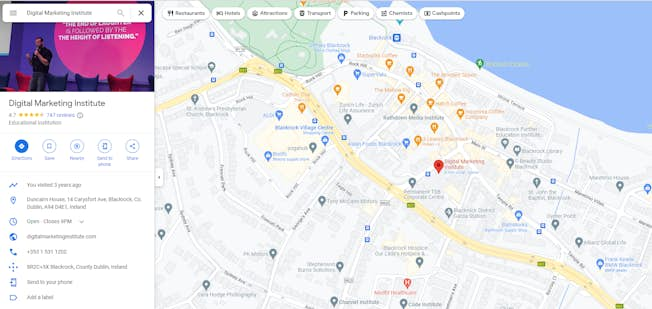
BrightLocal reported that more than 5 percent of views on a Google My Business page result in a conversion. That’s great ROI for a local business if you get your GBP page right!
You may be wondering what kind of business needs local SEO. The answer is any business in a local area that has contact with customers. It’s not only about driving sales or revenue. you can use local SEO to build brand awareness or provide information (or solutions) that provides value.
Local SEO Audit
Before you can improve your local SEO, you need to figure out where your business stands right now. The first step to doing this is to conduct an audit of your local SEO.
So what are the things you should look at?
- Run keyword research for local queries - Conducting keyword research will help you choose the most relevant keywords for your target audience and see keywords you may be ranking for that you can build on. There may be local terms or phrases you can use to localize the content to drive more qualified traffic. Here’s a list of free keyword research tools you can use to help in the discovery process.
- Audit your Google Business Profile - Your GBP content is populated automatically by Google so it’s key that you review it to see what content is included such as the description, location, services, and products. In local SEO, websites and Google Business Profiles are closely connected and can boost traditional results, based on location and reviews, while your website can enhance your GBP profile and leverage it to drive more sales. This can trigger your profile to show up for more local queries and even display messages based on website content.
- Check the number of local reviews - Reviews are key to any business, so take the time to review and reply to any reviews - the good and the bad. If you don't have any, it’s worth investing some time in trying to source and get reviews that give your business some credibility and build trust. Read our article ‘5 Tactics to Get Great Customer Reviews’ for some great tips.
- Optimize tags for local queries - This element is important if you have more than one location or branch. For example, if you have one branch in Vancouver and another in Toronto, you should optimize both pages with relevant tags such as headers or titles depending on the queries for each location. Then that page will be connected to your GBP for that specific location and when someone in Toronto searches for your business the Toronto page will appear first.
- Ensure the website is well optimized for user interaction/user experience - This is about how a user interacts with your website. Is the journey from one page to another easy? Are your page load times quick? Is there a flow in your content? Make sure that the tone and language are consistent across your website, including any landing pages you may have used for campaigns or blogs.
- Check for backlinks and see if locally relevant backlinks exist - High-quality backlinks or external links are a great way to rank your website but also ensure the traffic coming to your website is relevant. View our SEO backlink analysis lesson to find out how to do this. You should also consider doing a search for duplicate content on other people’s sites.
- Check for the presence of local directories - Local directories and also Yelp are great places to list your business. Check if there are any reputable ones in your area to add your business to. Local newspapers (offline and online) often include a directory or some type of local listing for free.
- Schema review (Ensure localized schema is added) - Schema markup (which can be found at Schema.org) is a form of microdata that creates an enhanced description (or rich snippet), which appears in search results. Find out how to get started here.
- Review internal linking - Internal links within your website are a way to drive traffic to key ‘money’ or value-add pages. If you have a blog, you should also have some internal links in each article that drives traffic to other blogs or parts of your site. Download tools or templates for successful blog posts if you’re looking to go in this direction to boost your internal linking.
How do you improve your local SEO?
Once you’ve conducted a local SEO audit, you should have a great overview of your website. Not only will you have identified areas to improve on but also areas that you perform well in which you can then capitalize on in this next phase.
When it comes to local SEO for small businesses, it’s a long game so expect the process to take some time to bear fruit but don’t just do it and leave it as is. For SEO you need to constantly monitor performance and make tweaks to maintain and improve your SERP rankings. So, how do you increase your local rankings?
Understand Local SEO ranking factors
Some ranking signals can determine how your business appears on SERPs. For local SEO, those signals include
- The location or proximity of your business - The area someone searches in is a ranking factor for your business showing up in their feed. If they do not type in a location, Google will perform a calculation based on the information your business provides across channels (e.g. website, social media, TripAdvisor, etc.) Always include a physical address on your website. If your company doesn’t have a brick-and-mortar address, optimize your website and landing pages by including your location in page titles and body copy. This example below from a plumber shows the areas the company serves in London by name along with a map to make it easy to find a location.
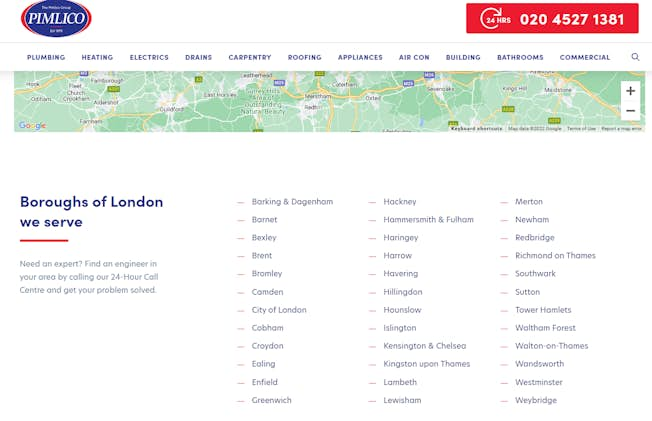
- Your Google Business Profile listing - As we mentioned above, ensure your listing is up to date and includes photos, reviews, business categories, opening hours, etc.
- Online reviews and ratings - If you do not have many positive reviews (or need to manage less favorable online reviews), contact your customers to see if they will leave one on Google, Facebook or Trust Pilot to build your credibility and social proof. Customer loyalty schemes are a great way to forge relationships and get customer reviews. You can always offer someone a freebie if they leave one - e.g. if you’re a nail salon, offer a free manicure. Email marketing can help you do this by reaching out to loyal customers.
- Relevant and valuable content - Search engines love good content that is valuable to a user. Ensure that your content is related to your business or service and of high quality to ensure a high ranking. Blogs can be helpful in this area.
- NAP (Name, Address and Phone) consistency - These core details should be the same on every webpage your company features to ensure consistency. If you’re not consistent, search engines may find conflicting information about your NAP and lose confidence in your listing.
- The number of quality backlinks - Backlinks from reputable and relevant companies are liked by Google. It’s about quality, not quantity. Check out ‘9 Best Practices to Generate Backlinks to Your Website’ to find out more.
- A localized website - If someone is searching for a local business, they want to click through to a site that is in their area and accessible. If you operate in a few areas, consider localizing landing pages to engage visitors.
Have a Local SEO strategy
The best way to guide your local SEO activities is to have a strategy. A local SEO strategy will help you to build brand awareness, increase rankings, drive traffic and boost leads. You can do this by
- Focus on your service or product - Understand what you provide and how that feeds into the keywords you want your business to rank for. So if you are a local florist, the terms you will want to be found under could be ‘fresh flowers’, ‘wedding bouquet’, or ‘floral arrangement’.
- Conduct an SEO audit - Follow the steps outlined above to conduct an audit to see how you are performing in terms of SEO.
- Perform keyword research - If you want to rank for local SEO, you need to use specific keywords or terms and also know the ones your competitors are using. Read our ’5 steps to Keyword Research’ to find out how to do local SEO properly.
- Apply on-page SEO - This step will optimize your website and tactics including alt tags, titles, meta descriptions, internal links and keywords.
- Link build locally - You can implement local link building by finding industry-relevant and local directories, sponsoring a local sports team (like Fusco Vehicle Sales below) or organization and asking for a link in return, or promoting PR stories to local newspapers and media outlets.
There are also a lot of bloggers out there, so see if there are any in your location or that specialize in your niche that may want a guest blog or give you a shout-out in an upcoming article for a quote. Check out this guest blogging guide and toolkit to see what’s involved.
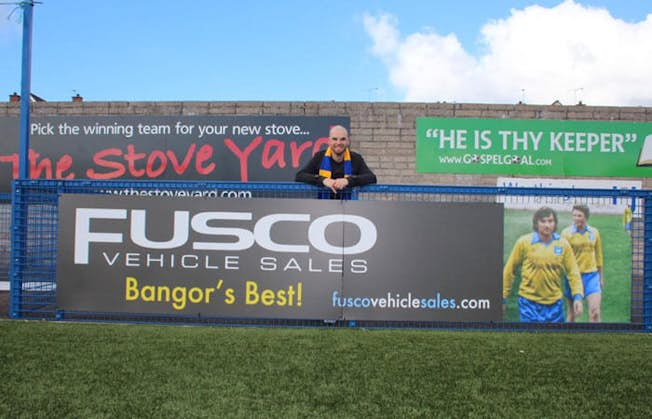
Use local SEO tools
Here are some of the SEO tools out there that can help you to optimize your website for ranking.
- Growthbar is a Chrome extension with a local keyword research feature
- Yext allows you to respond to reviews across different platforms
- SEMRush position tracking tool allows you to see a summary of your domain’s visibility, estimated traffic, and the average position for all your tracked keywords
- Ahrefs is a web crawler site used to highlight the weakest parts of your website and see your competitor’s backlinks
- Ubersuggest is an SEO keyword finder tool that allows you to find short- and long-tail phrases to use
Create locally targeted content
As mentioned above, the most effective way to use local SEO is to localize your content. That includes your website, custom landing pages, blogs or FAQ pages, and basically, any content that your customer will see or hear (voice search is on the rise and very focused on local content).
Here’s an example from Denny’s that uses a customized landing page to provide information about their Florida branch.

You can also create an experience around a location like the Marriott Hotel in New York. It focuses on the city and what it has to offer and ties it to its location and accommodation.
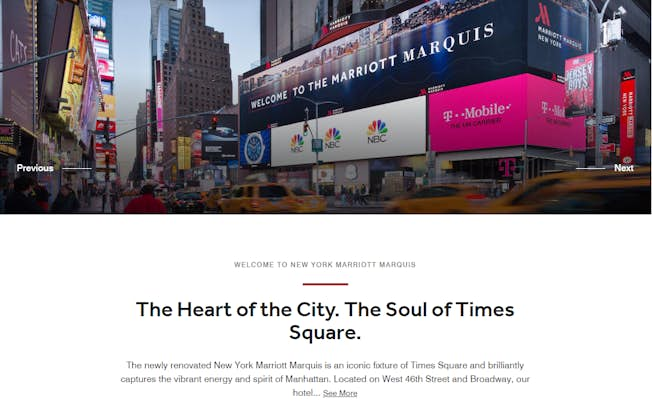
You can also create a blog based around a location to tap into keywords but also show authority. Location-specific blogs are a great way to achieve this as they help to match a person’s search intent with the content. Expedia uses its blog effectively to feature locations through engaging content that drives traffic and conversions.
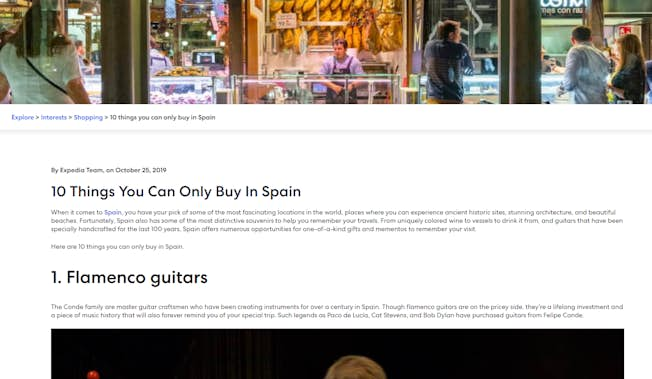
Check out some tools and templates for successful blog posts to create your own.
Local events are another way to attract a local audience. Bronx Zoo has a dedicated page for its events along with exhibits and experiences to tap into local searches.
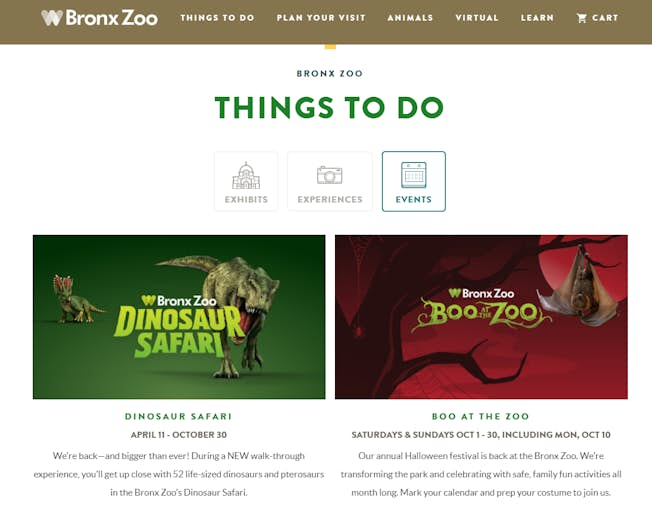
Download A Local SEO Checklist
Local SEO Checklist
Use SEO to rank, drive traffic and grow your business
SEO is a simple and effective way to get your brand and content seen by your audience. DMI has partnered with Neil Patel to offer you a Search Marketing course that will cover paid search campaigns, SEO optimization, demand generation, search analytics, and much more. Reserve your place today!
Related
Upgrade to Power Membership to continue
your access to thousands of articles, toolkits, podcasts, lessons and much much more.
Become a Power Member- Login
- View Courses
- - - -
- Courses
- Resources
- - - -
- My Account
- Change Password
- Logout





